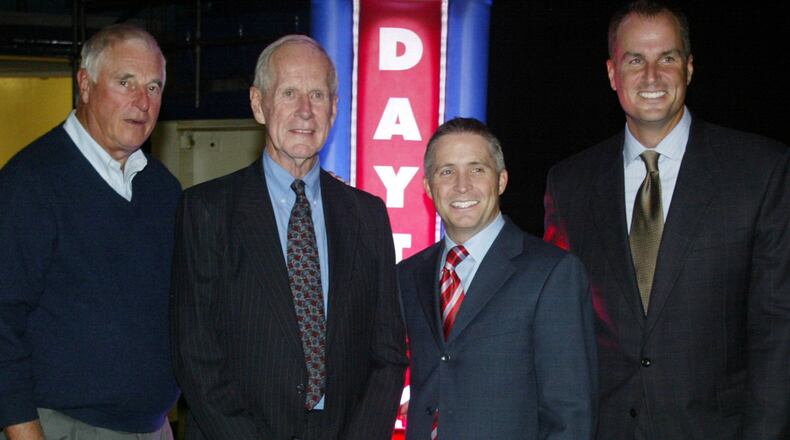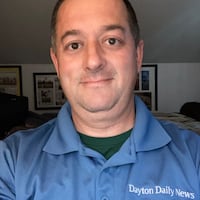Knight, who died on Wednesday at 83, had a long relationship with Donoher. They developed a friendship in 1968. They knew each other previously, Donoher said in a 1975 Journal Herald story, but got to know each other during the NIT in 1968 when both played first-round games on a Saturday in New York City.
Knight was then the head coach at Army, and his team lost to Notre Dame. Dayton beat West Virginia later that day. Tates Locke, the former Army head coach, told Donoher he might get help from Knight in scouting Dayton’s next opponent, Fordham. Knight did provide information and helped again when Dayton played Notre Dame in the semifinals.
“You could tell he had a really keen basketball mind,” Donoher said then. “Even in those days (Knight was 27), he had the respect of all college coaches.”
Knight’s help stopped when Dayton reached the NIT championship game, according to a speech Donoher made to the Centerville Noon Optimists Club in 2018.
“Congrats, I know nothing about Kansas,” Knight wrote Donoher. “I assume UD pays you a salary, so maybe you can figure this one out on your own.”
Dayton beat Kansas anyway for the second of its third NIT championships. Knight and Donoher stayed in touch, though Knight never coached against Donoher. Dayton and Indiana still have never played.
Bob Knight helped Dayton beat Fordham and Notre Dame in the 1968 NIT, according to this 1975 Journal Herald story by Jim Zofkie. pic.twitter.com/22vV95zY0z
— David Jablonski (@DavidPJablonski) November 2, 2023
Knight did bring the Hoosiers to UD Arena for the NCAA tournament games in 1975 and 1981. Here’s a recap of those games.
• March 20, 1975 (Mideast Regional semifinal): Indiana 81, Oregon State 71
Steve Green scored 34 points on 14-of-19 shooting for the Hoosiers, who improved to 31-0 in Knight’s third season. Jim Crews, who would later coach at UD Arena many times while at Evansville and Saint Louis, saw one minute of action for Indiana and scored two points.
• March 22, 1975 (Mideast Regional final): Kentucky 92, Indiana 90
Despite 33 points and 23 rebounds by Kent Benson, top-ranked Indiana lost to a team it beat 98-74 in December. Mike Flynn scored 22 points for No. 5 Kentucky, which advanced to the Final Four, where it beat Syracuse, and then lost to UCLA in the national championship game. Indiana wouldn’t lose again until the second game of the 1976-77 season. It finished 32-0 in the 1975-76 season and remains the last undefeated NCAA champion.
• March 14, 1981 (Mideast Regional, second round): Indiana 99, Maryland 64
Indiana’s run to the second of three national championships during the Knight era began with this victory. Future Hall of Famer Isiah Thomas scored 19 points and had 14 assists. Ray Tolbert led the Hoosiers with 26 points.
“We got our fannies beat,” Maryland coach Lefty Driesell said. “It didn’t matter who they were playing. IF they were playing the 76ers today, they would have beaten the 76ers.”
In February 1983, Knight picked Donoher to be on his staff for the 1984 Olympics in Los Angeles. The job started in the spring of 1983 when Donoher and Knight traveled to France to scout the European championships. On an off day, they toured the battlefields of Normandy. Donoher drove. Knight navigated.
The U.S. team held its training camp in Bloomington, Ind., in 1984. Led by Michael Jordan, Patrick Ewing, Chris Mullin, etc., the team won the gold medal that summer in Los Angeles.
After the experience coaching with Knight, Donoher returned to Dayton and talked to Collett in late August 1984.
“It was like spending a summer in the ultimate (basketball) workshop with one of the greatest coaches and the greatest players,” Donoher said. “No one who wasn’t part of it will ever appreciate the intensity of it all. With the one-sided games, everyone assumes we were that much stronger than the opposition. Having scouted the Europeans in both 1983 and early this summer, I was really concerned going in and Bob was even more so. I think what happened was exactly the way Bob planned it. We developed a team that applied the relentless defense that frustrated them. Looking back, I’d say we had a team on an emotional crusade that made the opposition look bad. But there’s no way we could have ever expected it to look so easy.”
When UD fired Donoher after the 1988-89 season, his 25th, Knight spoke to Collett and defended his friend.
“When I was named coach of the U.S. Olympic team, nobody could have wanted to represent the United States better than I did,” Knight said. “So why did I pick Donoher to help me? Because I couldn’t get a better coach. I may not know a lot of things, but I think I know basketball and I know I know more basketball than (Tom) Frericks and Brother (Raymond L.) Fitz. Donoher has maintained a very good Division I basketball program for 25 years during a period when his salary was probably $25,000 under the average Big Ten coaching salary.
“Over the years, I’ve had a lot of people call me and ask me if I thought Don would be interested in another coaching job,” Knight continued. “When I called him to ask if he was interested, he invariably said, ‘No; I don’t even want to talk to them.’ He was content to stay in Dayton. He has had a love affair with the school and the community. I think this is what burns me the most. Here is a man who had chances to leave, and I’m talking about some major jobs that have come open.
“He has never gone in to Frericks and said, ‘Look I’ve got this opportunity and it will pay me such-and-such.’ He’s never tried to use that to improve his earning power.”
Knight also had good things to say about Donoher when he spoke at “Celebration of Flyer Basketball” at UD Arena in 2007.
“There’s nobody that I’ve enjoyed more as a friend, respected more as a coach and thought did a better job in coaching in the circumstances that developed throughout his tenure at the University of Dayton,” Knight said.
Bob Knight had a lot of opinions on Dayton's firing of Don Donoher in 1989, and I'm sure UD fans had a lot of opinions on Knight's opinions. pic.twitter.com/kMNOXW9DbE
— David Jablonski (@DavidPJablonski) November 2, 2023
About the Author

